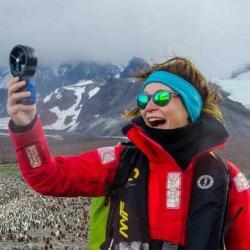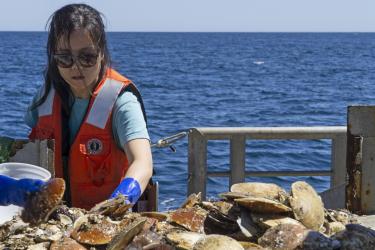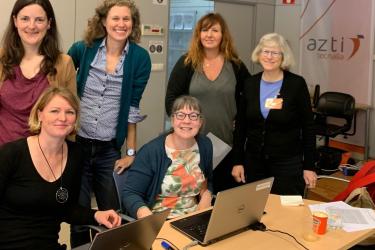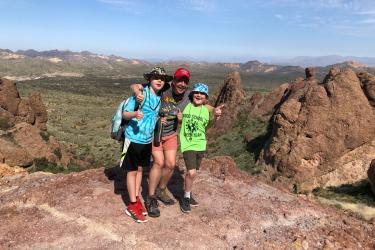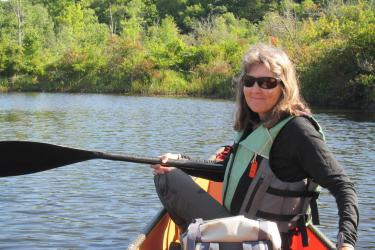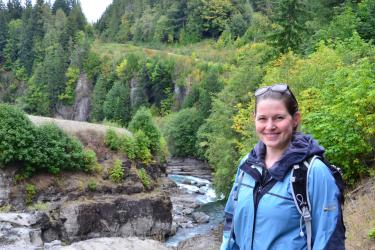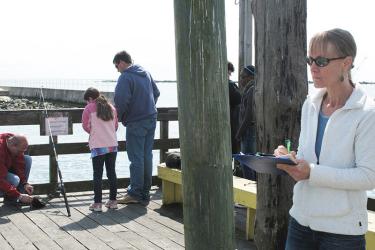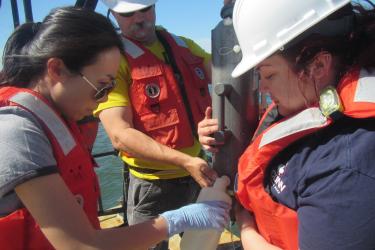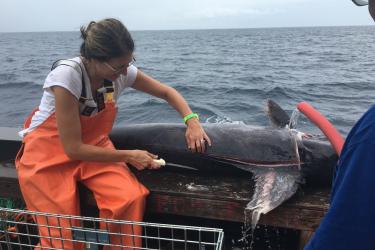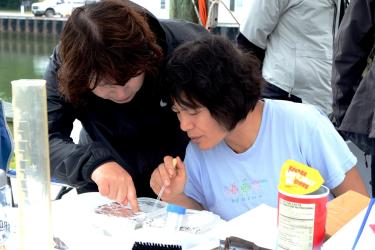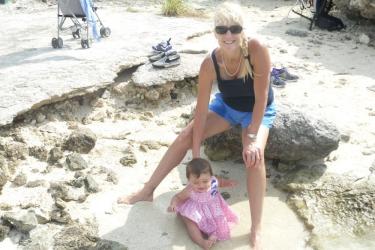Northeast Women's History Month Series
March is Women’s History Month. Every year we ask several of our women scientists to share a little about their science journey, what hurdles or obstacles they’ve experienced during their journey, how they overcame them, and what advice they might have for the next generation of women scientists. They're candid, honest and full of sage advice. Tune in each week in March as we share their incredible stories.
Dvora Hart
Operations Research Analyst
Science is increasingly collaborative. Develop a network of colleagues, mentors, etc. Always be ready to learn new things, including outside your primary area of expertise.
Megan Amico
Fish Biologist
It’s normal if your path into your field isn’t linear! My career with the science center started after some time working in other areas. I worked as a Northeast fisheries observer, at Starbucks, and even as a microbiologist before starting at NOAA.
Angela Silva
Social Scientist
It’s easy to begin your career and keep to the skills you’ve learned in school and prior work. Being strict with yourself in setting aside time to learn new skills—something I still struggle with—will always open up more opportunities in the future.
Gillian Phillips
Community Ecology Technician
Don't be afraid to try new or different things. I’ve had many opportunities to work on new things that weren’t exactly what I thought I would be doing—and that is okay!
Gabrielle Clardy
Groundfish Program Assistant Lead
Always keep your eyes on your goals. Remember, life is a journey meant to be explored. Your career path may not always be linear and that’s OK. Having an amazing support system of friends, family, and mentors made my career journey worth it.
Catherine Foley
Fishery Biologist
I think the biggest hurdle I faced was learning to accept rejection. The science world is full of it—losing out on a fellowship or grant, having a paper rejected, reading scathing reviews, applying to 5 million jobs before finding the right one. Rejection hurts, but in the science world you need to get used to it and understand that it’s (usually) not a reflection of you or the quality of your work.
Ann Petersen
Fisheries Biologist
I’ve found pursuing a career in science extremely rewarding. It’s given me a healthy work-life balance and a liveable wage. I’ve seen my graduate school women friends become leaders in their fields while raising families.
If you are interested in being a professional scientist—absolutely go for it!
Changhua Weng
Social Scientist
I love my work. I feel lucky that we have sufficient funding to support all the projects we’re doing. Outside of work, I am a mom of a 5-year-old. Naturally, one of the biggest obstacles I still experience is not having enough time to learn new things and expand my scientific research skills.
Genevieve Bernatchez
Physical Science Technician
My official title is physical science technician. Simply put, I’m the instrument maven for chemistry samples. I’m in charge of analyzing most of the water chemistry samples we have at the lab. That allows me to work on various projects. I like that my days are never the same.
Victoria (Tori) Kentner
Data Scientist
I think I've always been a scientist. As a kid I spent almost all my time outside exploring, collecting, and observing the natural world. I tested my parent’s patience with my insistent need to know "why."
Diane Kapareiko
Microbiologist
I became a scientist because I had a passion and curiosity about nature. I’ve found it very rewarding to be a member of a team of scientists working together towards a greater common goal—to preserve and sustain our natural resources. Wet and dirty field work? I’m there!
Catie Alves
Social Scientist
I became a scientist to combine my passion for the ocean with my keen attention to detail to protect and conserve marine ecosystems. I strive to understand the technical side of conservation and help bridge the gap between policymakers, the public, and other stakeholders.
Michelle Passerotti
Fish Biologist
I became a scientist because science, especially biology, is captivating. It’s alive. It moves and breathes. We can know every foundational principle, then life adapts and we have a thousand new things to learn. I’ve never wanted to do anything else.
Valerie Ouellet
Species Scientist
Although there are real challenges for women in sciences, don't let that stop you. Remember there is always something to learn from a bad experience. Be bold! Go after opportunities that interest you. The worst that can happen is that it doesn’t work out. You still learned something and you can always try again!
Jui-Han Chang
Research Biologist
Recently, scientists have become more aware of the patterns and changes in both time and space. This is probably because the improvements in technology and data collection allow them to see things in new ways. And as technology improves, advanced computer hardware and software become more available. Using these new technologies to find answers more efficiently and effectively is the next new, exciting area of the work I do.
Patricia Clay
Anthropologist
In those early years, I took my work seriously. I used available data in existing databases, coordinated a meeting of regional social scientists, and began producing Social Impact Assessments. I showed that I was determined and knowledgeable. That paved the way for more anthropologists in the Northeast and other NOAA Fisheries regions throughout the United States.
Katey Marancik
Fish Biologist
The growing need to communicate science better is pretty exciting to me. Professional communicators and journalists are needed now more than ever, but we scientists need to be communicating directly as part of the package. This is a great opportunity to show our artistic sides.
Renee Mercaldo-Allen
Research Fishery Biologist
Most of my recent work relates to studying aquaculture in the environment, including effects of shellfish harvesting on benthic communities in Long Island Sound.
Amanda McCarty
Chief, Fishery Monitoring and Research Division
I decided I wanted to be a marine scientist when I was in 5th grade. I grew up surrounded by lakes and rivers in Minnesota, so I always loved the water.
Lisa Colburn
Anthropologist, Social Sciences Branch
My journey as an applied anthropologist began as a child when I lived in a multicultural neighborhood in Los Angeles, California. There I was exposed to people with a variety of different languages, beliefs, and traditions.
Yuan Liu
Biologist, Ecosystems & Aquaculture Division
I didn’t grow up knowing that I’d become a scientist. As a student, I had shown similar interests and talents in both science and arts. In China, we need to decide if we’d be science-oriented or art (i.e., 文史: language/history)-oriented by the U.S. equivalent of junior high.
Katie Shelledy
Junior Acoustician, Fisheries Ecology Branch
A classmate told me that marine biologists study dolphins all day, every day—something I now know to be a misconception—and my second-grade self immediately decided to become a scientist.
Holly McBride
IT Specialist, Data Management Systems
Both of my grandparents worked for NOAA, my grandmother in the payroll department for NOAA Corps and my grandfather a cartographer and Division Chief of the NOAA Aeronautical Chart Division. His Department of Commerce silver medal hangs in my office.
Judy Li
Research Ecologist, Aquaculture Sustainability Branch
Judy is a research ecologist at our Milford Lab in Connecticut and works in our Aquaculture Sustainability Branch. She conducts phytoplankton and coastal environmental research related to fisheries, particularly aquaculture.
Beth Sharack
Chemist, Habitat Ecology Branch
"At every level of science—from research technician to Ph.D.—there's something to be gained from women working with and supporting each other."
Find out what else Beth had to say
Nicole Charriere
Biological Science Technician, Ecosystems Surveys Branch
"Do what you love. You’ll spend a large portion of your life working, so make that time count by doing something that excites you and makes you enjoy going to work every day. Not only will you be happier, you’ll probably be more successful too."
Paula Fratantoni
Chief, Oceans and Climate Branch
"Embrace challenges as opportunities, especially those that are accompanied by a large red flag of self-doubt. Be brutally honest with yourself about the reasons behind your choices, especially when they mean saying no to an opportunity."
Elizabeth Marchetti
Field Scientist, Narragansett Lab
"All roads have their challenges. I think it’s crucial to remain true to yourself. Be proud of who you are and where you come from."
Interested in what else Elizabeth had to share?
Beth Phelan
Chief, Fishery Ecology Branch
I grew up a city girl in Yonkers, New York, and while the city is on the banks of the Hudson River, the closest I got to nature was the cemetery down the street. Railroads and a lot of city separated my family’s apartment from the river.
Amy Martins
Chief, Fisheries Sampling Branch
My interest in science started when I was a young child and continued through my college years. I was a bit of an outdoor dreamer and a voracious reader. I read National Geographic magazines, encyclopedias and field guides – memorizing characteristics, Latin names, population estimates, behaviors, adaptations, etc.
Kimberly Hyde
Oceanographer, Ecosystems Dynamics and Assessment
I have always been curious about how things work and grow, and that curiosity was encouraged by my father who taught me to ride a horse, fish, helped me with my science fair projects, took me on his veterinarian farm calls, and gave me a true appreciation for Mother Nature.
April Croxton
Fishery Biologist, Aquaculture Sustainability Branch
Growing up, I was a big fan of nature shows that highlighted marine animals and the marine environment. During this time I was fascinated by dolphins, and can admit that I wanted to “save the dolphins” from pollution and other harm caused by humans.
Christine Lipsky
Fisheries Biologist, Maine Field Station
It’s funny thinking about it now - so many of the things I did as a kid can be looked at as having an interest in science. When I was a kid, it was all just fun, play, and curiosity. I baked cakes and cookies as much as possible, and I loved that I knew the difference between the way baking soda and baking powder worked.





